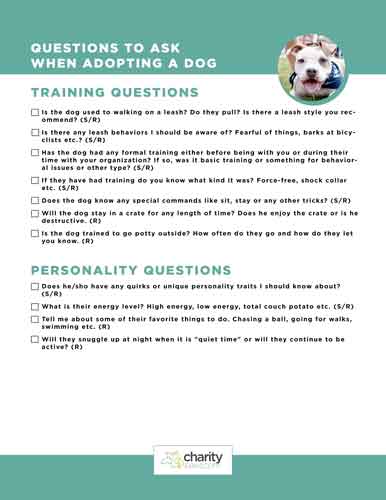If you are reading this, then you must be considering adopting a rescue dog.
Adopting a dog is an amazing experience, but can be overwhelming.
Knowing the right questions to ask when adopting a dog or puppy can make all the difference in having a long happy future with your rescue dog.
If you are considering adopting a pit bull, there are a few other things you should know too!
Having volunteered at many shelters and rescues over the years, the one thing I see too often is that people are too quick to adopt without getting all the information they can about the dog.
The importance of training, energy level, medical history, and a breed-specific trait of a pet is often overlooked as pet owners are caught up in looks or breed.
I hope this article will help you do a more diligent search to make sure you adopt a dog from a good rescue group that will become a lifelong family member.
The many questions below can also help decrease the chance that you will need to return the dog.
The one great thing about adopting from a rescue as opposed to a shelter is that many of the rescue dogs in their care are in foster homes.
What Is A Foster Home?
A foster home is a real home where dogs can stay while they await their forever homes.
They live with a family and sometimes other pets and learn what it is like to “be a dog”.
This means you can get a better understanding of how a dog is in a home environment as well as if they are good with cats and around other dogs.
The questions below are all recommended and can give you a lot of insight into the dog you are considering adopting.
You may not be able to get the answers to all of the questions.
Do not let that scare you off though, it is normal for a rescue group or shelter to not have a full history of the dogs in their care.
Some dogs come in as strays, some may be owner surrenders who offered no information, there are many reasons the history of a rescue dog may be unknown.
None of this makes these dogs less adoptable though and often will make the best pet ever for your family since they will be thrilled you saved them.
Questions To Ask A Shelter Or Rescue Before Adopting A Dog
Below is a list of questions I recommend you ask before you adopt a dog, no matter the breed. Next to each question you will see either a S, R or S/R which signifies whether a question should be asked to a shelter or rescue or both.
General Questions
- How long has the dog been with your rescue or shelter? (S/R)
- Do you know the age of the dog? (S/R)
- Has he/she been adopted out and returned or would this be their first adoption? (S/R)
- If they have been returned what was the reason? (S/R)
- How did the dog wind up in your rescue or shelter? Were they a stray, surrender etc.? (S/R)
- Do you know the previous owner or breeder? (S/R)
- What kind of condition was the dog in when you received them? (S/R)
- How long has your rescue been helping dogs? (R)
- What is your policy if the dog is not a good match for our family after we bring them home? (S/R)
- If I take my dog to the vet after adopting him/her and find there is a severe illness, does your rescue assist us in any way? (S/R)
- Is there any signs of physical or mental abuse I should know about? (S/R)
Please note that rescues are only funded by donations.
While some rescues might actually help with vet bills if they adopt out an unknowingly ill dog, many are not in the financial state to assist.
While I recommend asking this question, please do not expect them to help!
We have a full guide to getting help with vet bills if this is a concern at any time.
Health Questions
Asking about the health of the dog is important!
Taking a dog home and finding health issues is something no adopter wants.
These are some basic questions to help you understand the health of the dog.
- Does the dog need to be spayed or neutered? If yes, will you take care of it before we adopt? (S/R)
- Has a heartworm test been done and if negative have preventatives been given? (S/R)
- If positive for heartworm has treatment been started or completed? (S/R)
- Are all vaccinations up to date including Rabies, Distemper, Parvo, Bordatello? (S/R)
- Can I get copies of the medical records to date if I adopt the dog? (S/R)
- Does the dog have a microchip? If not, will it be done before adoption? (S/R)
- When was the dogs’ last full physical exam? (S/R)
- Has the dog had a dental exam done? (S/R)
- Are you aware of any medical issues that I should be aware of? (S/R)
- Is there any special requirements for grooming or bathing? (S/R)
- Does the dog require any specific foods? (S/R)
Make sure you do your own due diligence as well.
When you see the dog check some of the following:
- Eyes should look clear and bright
- The nose should be free from discharge
- Ears should be clean and not show redness or infection
- Teeth should be free from tartar and gums should be pink. Older dogs may show some signs of decay, but you do want to make sure it is still somewhat healthy.
- Fur should be clean and free from lesions or infections
Of course a vet visit will be the first thing you want to do after you adopt a dog.
But looking at these few things will help you see their general overall health.

Free PDF Download
If you are enjoying this post and find it useful, well guess what – you can get a PDF of it! This PDF has all the questions listed here that you can print and take with you.
Enter your email and you will receive an email with a link to download and print at home.
Behavioral Questions
These questions will give you insight into whether the dog has any behavioral issues that may affect your decision to adopt.
Please understand that a shelter may have less answers about a dog’s background and personality than a rescue since it is very hard to assess a dog in a shelter environment.
Do not get frustrated if a shelter cannot answer your questions.
They may not be able to give you a great answer or know how to answer the question.
- Will the dog be good with children? If so, what ages are recommended? (S/R)
- Has there been any reactivity issues with men, women or children? (S/R)
- Have you noticed issues with barking or jumping? (S/R)
- Is the dog, cat or small animal friendly? (S/R)
- Has the dog been in social gatherings with other dogs? Can I take him safely to dog parks or on walks with other dogs? (S/R)
- Are there any signs of fear aggression? If so, what are the triggers? (S/R)
- Are there any issues with chewing or destructive behavior? (S/R)
- Has the dog been left alone for long periods of time? If so, has there been any sign of separation anxiety? Is barking an issue for example? (R)
- Have you noticed any signs of resource guarding of people, toys, food etc.? (S/R)
- Is there any bite history? (S/R)
- Has he been tested in the car to see how he does? Does he get car sick or anxious or is the ride an enjoyable experience? (R)
- Has the dog been around children in the home or elsewhere? How was the reaction? (R)
- Is the dog a love-bug type or prefers to be a loner? (S/R)
- Where has the dog been sleeping at night? Crate, people bed, dog bed etc. (R)
- Has the dog had any accidents in the home during their foster experience? (R)
If you have other pets or children, it is important to be sure the dog has been cat (or small animal) and kid tested.
The shelter will typically test to make sure a dog can be in a home with kids or other pets.
I would highly recommend a “meet-n-greet” with the rescue or shelter if you have other dogs in the home.
Bring your dog to the shelter or foster home and let them meet to see if they could potentially get along.
Dog Training Questions
These questions will help you understand the level of training a dog may have or not had and what motivates them to have a more positive behavior.
- Is the dog leash trained? Do they pull? Is there a leash style you recommend? (S/R)
- Is there any leash behaviors I should be aware of? Fearful of things, barks at bicyclists etc.? (S/R)
- Has the dog had any formal training either before being with you or during their time with your organization? If so, was it basic training or something for behavioral issues or other type? (S/R)
- If they have had training do you know what kind it was? Force-free, shock collar etc. (S/R)
- Does the dog know any special commands like sit, stay or any other tricks? (S/R)
- Will the dog stay in a crate for any length of time? Does he enjoy the crate or is he destructive. (R)
- Is the dog potty trained? How often do they go and how do they let you know. (R)
Dog Personality Questions
Personality plays a big part in how well a dog can acclimate to your family.
These are some of the more important questions to ask to ensure you get the best match possible for your unique family.
- Does he/she have any quirks or unique personality traits I should know about? (S/R)
- What is their energy level? High energy, low energy, total couch potato etc. (S/R)
- Tell me about some of their favorite things to do. Chasing a ball, going for walks, swimming etc. (R)
- Will they snuggle up at night when it is “quiet time” or will they continue to be active? (R)
Think about the things your family loves to do together.
If you love to camp together, ask about that.
If you are an avid hiker or sportsman be sure to ask if the dog you are considering is up for that challenge with you.
Questions To Ask Before Adopting A Puppy
Many of the questions above may not apply to puppies.
They may be too young to really understand their personality and have had no real training yet.
Puppies need special vaccinations and should have an initial vet visit done, so it would be important to make sure that is all completed.
Ask About An Overnight Stay Or Foster Opportunity
Adopting from a shelter can be a little scary since there are more unknowns than when adopting from a rescue.
Are you interested in a specific shelter dog?
Ask if they have any overnight or foster programs you can take advantage of.
This allows you the opportunity to bring the dog home for a certain period of time, and will allow you to see if the dog is a good fit for your family.
You can then look at whether they can be left alone, if the energy level is good for your family and get a feel for their food and behavior habits.
If your local shelter does not offer anything like this, then you can ask a local rescue group in your area if they will help you.
Sometimes they can “pull a dog” and take them into their rescue and then you can foster the dog.
There are some downsides to this since now the rescue is responsible for the dog and if you do not want to keep the dog they have to find a home for.
But, it is another option to consider.
Bringing Home Your Rescue Dog
Yay! You have not brought home your new dog and are ready to begin your life together.
You might be excited to show off your new friend, of course it is best to wait before bringing your friends by to avoid undue stress.
It is important you give your rescue dog some time to “decompress”.
Give them time to sniff around so they can feel comfortable in their new surroundings.
Start guiding them on what is acceptable or not acceptable behaviors.
Give them time to explore their new fenced yard and of course give them lots of love.
The first few weeks are important for them and you.
Eventually, if you do it right, you will have an amazing best friend who will bring your family so much happiness.

